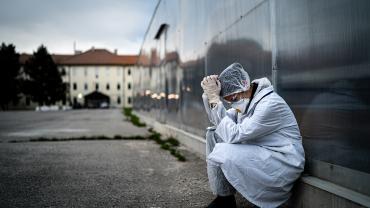
Health-care workers treating COVID-19 patients are feeling the psychological impacts. There’s no denying that times are stressful, and for health-care workers on the frontlines, stress isn’t the only symptom. Several recent studies have revealed that nurses, doctors, medics and other nonmedical health-care workers (especially women, in particular) are experiencing high levels of distress, anxiety, burnout, stress and depression during this global pandemic.
According to a study published in March in JAMA Open Network, health-care workers who directly engage in diagnosing, treating or nursing COVID-19 patients are experiencing increasing symptoms of distress, insomnia, depression and anxiety. The cross-sectional study included 1,257 health-care workers from 34 different hospitals across multiple regions in China that are equipped with treating COVID patients. Researchers assessed the degree of mental health outcomes and related factors among these workers for 6 days and found that study participants reported symptoms of depression (50.4%), anxiety (45%), insomnia (34%) and distress (71.5%). Authors of the study conclude that “special interventions to promote mental well-being in health care workers exposed to COVID-19 to be immediately implemented, with women, nurses, and frontline workers requiring particular attention.
Findings from another recent study from Columbia University Irving Medical Center and New York-Presbyterian, which was published in the General Hospital Psychiatry journal showed that more than half of nurses and doctors experienced symptoms of acute stress. This study is the largest study in the U.S. to date that has documented the psychological impact among health-care personnel working on the frontlines at the height of the pandemic in New York City. The study also indicated that nearly half of the nurses and doctors reported depressive symptoms, one-third had anxiety, and most of them experienced loneliness and insomnia. The results showed that nurses and advanced practice providers experienced the highest rates of acute stress. Study participants said they were incapable of keeping their minds off the virus, and they constantly felt “on guard” with a sense of numbness or detachment from people.
Unfortunately, women in health-care are particularly at increased risk of experiencing these symptoms, and more “specifically younger and mid-career women, triggered by a variety of individual, organizational and systems-level factors.” Common triggers included lack of social support, family status, access to personal protective equipment, high workload, rapidly changing public health guidelines and a lack of recognition at work.
Researchers found that online mental health resources for stress reduction are poorly used by women, and they’d prefer to use self-help resources, positive messages and social support instead. The authors identified additional measures that can positively impact female health-care workers such as financial support, rest areas for sleep and recovery, meal plans provided during shifts, manageable workloads, and access to leisure activities and counselors.
Health-care workers aren’t the only ones feeling the psychological impact. The ongoing “COVID-IT-mental health trial” shows that isolation, physical distancing and other containment measures due to the unprecedented COVID-19 events are having detrimental consequences on the mental health of the general population worldwide.
A Chinese study elucidated that nearly 35% of the population experienced mental distress and that women 18 to 30 years old, as well as older women >60 years of age are most vulnerable to stress and developing post-traumatic stress disorder. Moreover, people in general (especially those living in cities) are fearful and have levels of worry and uncertainty, as the pandemic is considered a “threat” everywhere and could be carried out by anyone.
What can we do to support our own health, each other’s health, and health-care workers’ overall mental health? Prioritizing sleep is by far the most important thing health-care workers can do for themselves, even those working the night shift. Incorporating healthy sleep and hygiene habits, avoiding excessive alcohol, sugar and caffeine (especially in the evening), not skipping meals throughout the day, but eating a micronutrient-rich balanced diet, and avoiding refined, processed and inflammatory foods may all help to tremendously improve overall mental health, stress levels and feelings of being burnt out. Consuming more omega-3 fatty acids, such as those found in fatty fish (i.e., sockeye salmon, sardines and anchovies) may reduce depressive symptoms. Omega-3 fatty acids possess anti-inflammatory properties and “promote neurotransmitter binding and intracellular signaling.” Gamma-aminobutyric acid, L-theanine and 5-hydroxytryptophan (5-HTP) supplementation may help improve symptoms of anxiety and depression, sleep quality and stress.
Finding some time for self-care (e.g., taking a bath, stretching, meditating, journaling, walking, dancing, self-massage and/or taking a nap), even if it’s for 10 minutes, helps promote a sense of calm and relaxation. Physical exercise, talk therapy, virtual support groups, and other religious or spiritual practices may be considered by health-care workers in support of their health to provide a healthy stress response and to improve their psychological health. For women, in particular, along with the self-care suggestions, as mentioned, finding social support is critical during these unprecedented times.
By Caitlin Higgins, MS, CNS, LDN